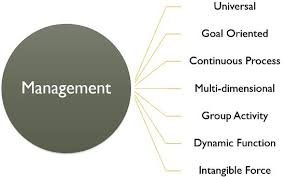The Importance of Effective Management in Today’s Business World
Management plays a crucial role in the success and growth of any organization. It involves planning, organizing, leading, and controlling resources to achieve specific goals and objectives. Effective management ensures that the company’s resources are utilized efficiently and that all employees are working towards a common purpose.
One of the key functions of management is planning. This involves setting goals, developing strategies, and creating action plans to achieve those goals. A well-thought-out plan provides direction for the organization and helps in making informed decisions.
Organizing is another essential aspect of management. It involves structuring the organization’s resources, such as people, materials, and equipment, in a way that maximizes efficiency and productivity. Organizational structure defines roles and responsibilities, establishes communication channels, and facilitates coordination among different departments.
Effective leadership is also critical for successful management. Leaders inspire and motivate employees to work towards common goals. They provide guidance, support, and feedback to help employees perform at their best. A good leader fosters a positive work environment where employees feel valued and motivated to contribute their best efforts.
Controlling is the final function of management. It involves monitoring performance against established goals, identifying deviations, and taking corrective actions when necessary. By maintaining control over various processes and activities within the organization, managers can ensure that operations run smoothly and efficiently.
In today’s fast-paced business world, effective management is more important than ever. With rapidly changing market conditions, technological advancements, and increasing competition, organizations need skilled managers who can adapt quickly to new challenges and opportunities.
Ultimately, good management practices lead to improved productivity, higher employee morale, better customer satisfaction, and increased profitability. By investing in developing strong managerial skills and fostering a culture of effective management within an organization, businesses can position themselves for long-term success in an ever-evolving marketplace.
Six Key Benefits of Effective Management: Boosting Efficiency, Culture, Decision-Making, Goal Achievement, Communication, and Adaptability
- Effective management enhances organizational efficiency and productivity.
- Good management fosters a positive work culture and employee morale.
- Strong managerial skills lead to better decision-making and problem-solving.
- Well-managed teams are more likely to achieve their goals and objectives.
- Effective management promotes clear communication and coordination within the organization.
- Skilled managers can adapt quickly to changes in the business environment, ensuring long-term success.
Three Detrimental Management Practices: The Impacts of Micromanagement, Poor Communication, and Ineffective Decision-Making on Organizational Health
- Micromanagement can lead to decreased employee morale and motivation, as it may make employees feel undervalued and hinder their autonomy.
- Poor communication from management can result in misunderstandings, lack of clarity on expectations, and reduced efficiency within the organization.
- Ineffective decision-making by management can lead to missed opportunities, wasted resources, and overall negative impact on the organization’s performance.
Effective management enhances organizational efficiency and productivity.
Effective management is essential for enhancing organizational efficiency and productivity. By implementing sound management practices, companies can streamline processes, eliminate inefficiencies, and optimize resource utilization. Skilled managers are able to set clear goals, assign tasks effectively, and provide guidance to employees, resulting in improved performance and output. When a company’s operations are managed efficiently, tasks are completed in a timely manner, costs are minimized, and overall productivity is maximized. This leads to increased profitability and competitiveness in the market, making effective management a key driver of success for any organization.
Good management fosters a positive work culture and employee morale.
Good management plays a crucial role in fostering a positive work culture and boosting employee morale within an organization. When employees feel valued, respected, and supported by their managers, they are more likely to be motivated and engaged in their work. Effective management practices such as clear communication, recognition of achievements, and providing opportunities for growth and development can create a supportive and encouraging work environment. A positive work culture not only enhances employee satisfaction and retention but also leads to increased productivity and overall organizational success.
Strong managerial skills lead to better decision-making and problem-solving.
Strong managerial skills play a crucial role in enhancing decision-making and problem-solving within an organization. Managers with the ability to analyze situations, evaluate options, and make informed decisions can steer their teams towards success. Effective problem-solving skills enable managers to identify issues, explore creative solutions, and implement strategies to overcome challenges efficiently. By honing these skills, managers can navigate complex business environments with confidence, leading their teams towards achieving goals and driving organizational growth.
Well-managed teams are more likely to achieve their goals and objectives.
When teams are well-managed, they are more likely to achieve their goals and objectives efficiently and effectively. A skilled manager can provide clear direction, allocate resources appropriately, foster collaboration among team members, and monitor progress towards the desired outcomes. By promoting a positive work environment and ensuring that each team member understands their role and responsibilities, a good manager can help the team stay focused, motivated, and on track to successfully accomplish their shared goals. Effective management of teams not only enhances productivity but also boosts morale and satisfaction among team members, leading to greater overall success for the organization.
Effective management promotes clear communication and coordination within the organization.
Effective management promotes clear communication and coordination within the organization. By establishing open lines of communication and defining roles and responsibilities clearly, managers ensure that information flows smoothly across different levels of the organization. This leads to better collaboration among teams, reduces misunderstandings, and enhances overall efficiency. With clear communication channels in place, employees are better equipped to work together towards common goals, making the organization more cohesive and productive. Coordination among various departments becomes seamless under the guidance of effective management, enabling the organization to respond quickly to challenges and opportunities in a coordinated manner.
Skilled managers can adapt quickly to changes in the business environment, ensuring long-term success.
Skilled managers play a crucial role in ensuring the long-term success of an organization by their ability to adapt quickly to changes in the business environment. In today’s dynamic and competitive landscape, businesses face constant challenges such as technological advancements, market fluctuations, and shifting consumer preferences. A skilled manager with the ability to anticipate and respond effectively to these changes can help steer the organization towards continued growth and profitability. By staying agile and proactive, skilled managers can lead their teams through uncertainty and capitalize on emerging opportunities, ultimately setting the foundation for sustained success in the long run.
Micromanagement can lead to decreased employee morale and motivation, as it may make employees feel undervalued and hinder their autonomy.
Micromanagement, a common con of management, can have detrimental effects on employee morale and motivation. When managers excessively monitor and control every aspect of their employees’ work, it can create a sense of distrust and demotivation among the team. Employees may feel undervalued and unappreciated, as their autonomy and decision-making abilities are restricted. This lack of trust and freedom can stifle creativity, innovation, and job satisfaction, ultimately leading to decreased productivity and overall dissatisfaction within the organization.
Poor communication from management can result in misunderstandings, lack of clarity on expectations, and reduced efficiency within the organization.
Poor communication from management can have detrimental effects on an organization. When leaders fail to effectively communicate with their teams, it can lead to misunderstandings, confusion, and a lack of clarity on expectations. Employees may not fully understand their roles and responsibilities, resulting in inefficiencies and errors in their work. Additionally, without clear communication channels from management, important information may not reach all team members in a timely manner, leading to delays in decision-making and implementation of strategies. Overall, poor communication within an organization can hinder productivity and teamwork, ultimately impacting the organization’s overall efficiency and success.
Ineffective decision-making by management can lead to missed opportunities, wasted resources, and overall negative impact on the organization’s performance.
Ineffective decision-making by management can have detrimental consequences for an organization. When management fails to make sound and timely decisions, it can result in missed opportunities for growth and innovation. Resources may be squandered on projects that do not align with the company’s goals or do not yield desired results. This can lead to financial losses and inefficiencies within the organization. Overall, poor decision-making by management can create a ripple effect that negatively impacts the organization’s performance, hindering its ability to thrive and compete in the market effectively.




